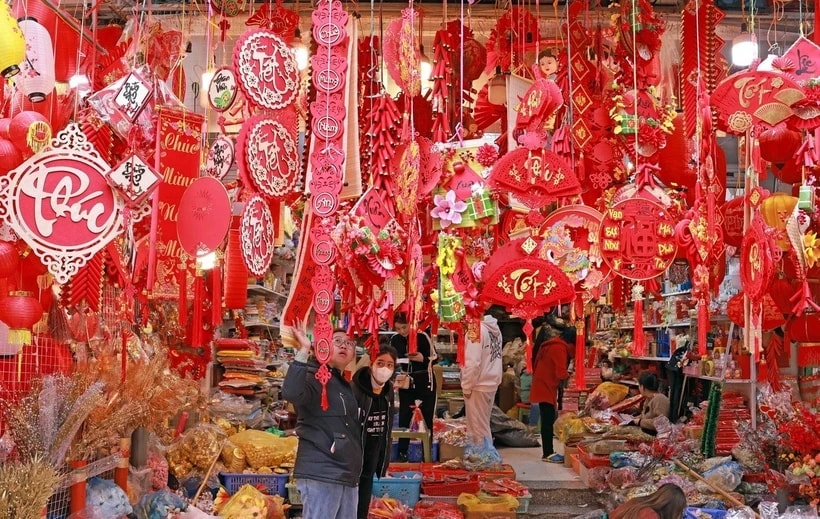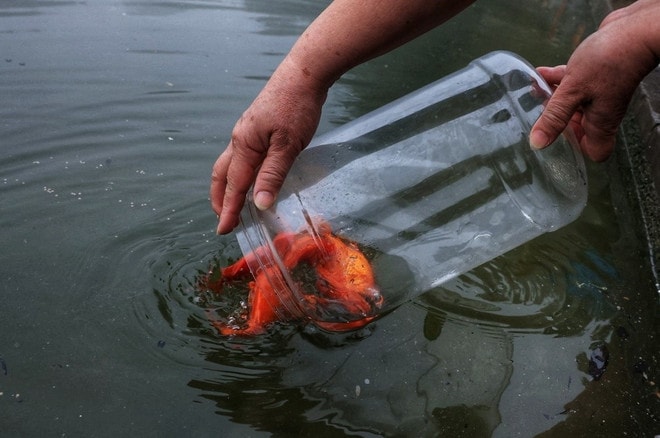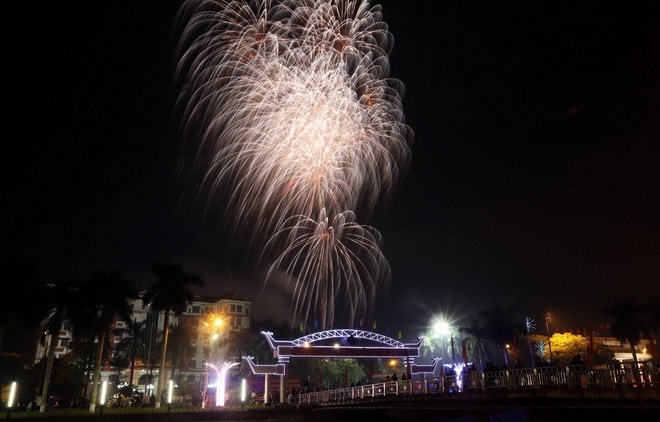Lunar New Year is the transition point between the old year and the new year, representing the eternity of heaven and earth, and people's desire for harmony between Heaven - Earth - Human. And above all, Tet is the day of reunion for every family.

As the lunar year gradually comes to an end, it is also the time when every Vietnamese family is busy and excitedly preparing for Tet Nguyen Dan - the biggest and most important traditional holiday.
So when did Tet Nguyen Dan start and what customs are indispensable during these days of reunion?
Tet Nguyen Dan is also known as Tet Ca, Tet Ta, Lunar New Year, Traditional Tet or simply Tet. "Tet" means "season."
The two words "Nguyen dan" have Chinese origin; "nguyen" means beginning or beginning and "dan" means early morning, so the correct pronunciation should be "Tiet Nguyen dan."
Lunar New Year is affectionately called "Tet Ta" by Vietnamese people to distinguish it from "Tet Tay" (New Year's Day).
According to the research of historian Tran Van Giap, the day "Tet Nguyen Dan" in Vietnam has existed since the beginning of the first century AD. The origin of the word Tet as well as the meaning of the word "Tet Nguyen Dan" has also been popular since that time.
According to the legend of "Banh chung, banh day," Tet Nguyen Dan may have appeared since the time of the Hung Kings, with the legend of Lang Lieu and Banh chung.
Tet is the transition point between the old year and the new year, representing the eternity of heaven and earth, and people's desire for the harmony of Heaven - Earth - Human. And above all, Tet is the day of reunion for every family.
Lunar New Year is the biggest traditional holiday, has the most widespread scope and is the most jubilant and bustling holiday of the whole nation.
Lunar New Year is also the most sacred and solemn moment for every Vietnamese person. It contains both the philosophy of life as well as the customs and beliefs imbued with the national culture, both profound and unique, reflecting the spirit of harmony between humans and nature.
As a sacred and lasting habit, every year when Tet comes, no matter where they are or what they are doing, Vietnamese people - even those living far away - still hope to return home to reunite under the warm family roof, to pray at the ancestral altar, and to look back at the house - the place where they were born.
The words "Going home for Tet" are not just a concept of going back, but behind it is a pilgrimage to the roots, to the place where one was born and raised.
Tet is also a day of reunion with the deceased. From the evening meal on the 30th, before New Year's Eve, families burn incense to invite the spirits of ancestors, grandparents and deceased relatives to come home to eat and celebrate Tet with their children and grandchildren (worshiping ancestors).
The incense smoke on the family altar blends with the sacred atmosphere of cosmic harmony, making people more attached to their families than ever.
Tet is also an occasion for everyone to strive for good and fulfilling values such as: eating well, dressing well, regardless of age, and saying nice things, wishing each other "all the best", "prosperity and wealth"...
Besides, Vietnamese people believe that if they have happy Tet days at the beginning of the year, they will have a good and lucky new year, so when Tet comes, everyone is happier, more comfortable, and more tolerant of each other.
Therefore, this is also an opportunity to reconcile conflicts and disagreements between family members, between neighbors… as the old people used to say “even if you are angry to death, it will stop at Tet”. With this meaning, Tet is also a day of optimism and hope.
Before and after Tet, Vietnamese people have many different customs, depending on the region. Below are some of the main customs.
Worshiping the Kitchen Gods
Mr. Cong is Tho Cong, the god who governs the land. Mr. Tao is the kitchen god, or Tao Quan, consisting of two men and one woman, responsible for monitoring everything that happens in the family and reporting to heaven.
Every year, on the 23rd of December, every family cleans their house and kitchen and then holds a ceremony to send the Kitchen God to heaven, asking him to report good things for a peaceful and lucky new year.

Visiting ancestors' graves
From December 23 to 30, all family members gather together to visit and clean their ancestors' graves, bringing incense, candles, flowers and fruit to worship and invite their ancestors' spirits to celebrate Tet with their descendants.
Cleaning and decorating the house
To welcome Tet, every family cleans, repairs and decorates their house beautifully. All household items are wiped clean in the true sense of the New Year, everything must be new. Adding kumquat trees, peach blossoms, parallel sentences… makes the space more colorful and cozy.
Organize New Year's Eve party
New Year's Eve means completing the work of the old year. According to custom, at New Year's Eve, everyone arranges to pay off all debts, erase conflicts of the old year to look forward to a more harmonious new year.
On the afternoon of the 30th of Tet, after finishing all the work, the family prepares a tray of food to worship their ancestors. Along with green Chung cake and red parallel sentences, the five-fruit tray is an indispensable item on the altar of every family during Tet.
Not only does it make the worship space warmer, more harmonious and brilliant, the five-fruit tray also vividly expresses philosophical-religious-aesthetic ideas and is a place to express the wishes of each family.
New Year's Eve
New Year's Eve is the most sacred moment of the year. At New Year's Eve, families hold a Tru Tich ceremony to remove the bad luck of the old year and welcome the good things of the new year.
Right on New Year's Eve, on the family altar, incense smoke and candles are fragrant, family members respectfully clasp their hands before the family altar, praying for a new year of peace, prosperity, and wealth.

Housewarming custom
According to custom, the first person to enter the house after New Year's Eve is the first person to enter the house. It is believed that the first person to enter the house in the new year will affect the future of the homeowner throughout the new year, and the age of the first person to enter the house is also quite important. Therefore, before Tet, the homeowner often makes an appointment with an acquaintance, someone with a good personality and a suitable age to come to visit their house.
Happy New Year
New Year greetings or lucky money are long-standing customs to wish the best things to come to everyone. According to tradition, on the first day of the New Year, children usually wish their grandparents and parents a happy new year. Grandparents and parents also wish their children and grandchildren a lucky money envelope.
Lucky money is usually new money, because people believe that if everything is new in the new year, the year will bring good luck.
During the first days of the year, usually from the 1st to the 3rd, people visit relatives, teachers, and friends to wish them the best for the new year.
TB (summary)